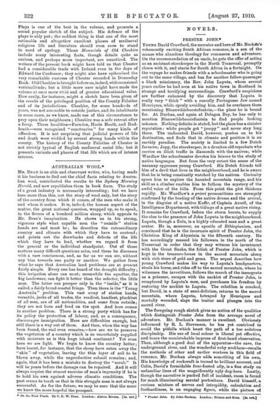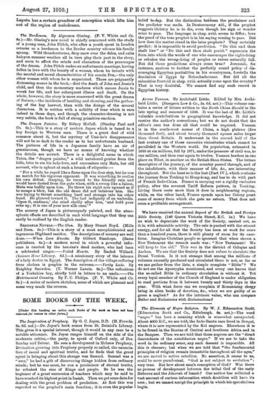NOVELS.
PRESTER JOHN.*
Yotrwa David Crawfurd, the narrator and hero of Mr. Buchtes vehemently exciting South African romance, is a son of the manse who abandons theology for commerce and adventure. On the recommendation of an uncle, he gets the offer of acting as an assistant-storekeeper in the North Transvaal, promptly closes with it, and starts for South Africa in a fortnight. On the voyage he makes friends with a schoolmaster who is going out to the same village, and has for another fellow-passenger a black missionary, the Rev. John Laputa, whom several years earlier he had seen at his native town in Scotland in strange and terrifying surroundings. Crawfurd's suspicions are further enhanced by the discovery that Laputa is really very " thick " with a rascally Portuguese Jew named Henriques, while openly avoiding him, and be overhears them mentioning Blaauwildebeestefontein,—the place he is bound for. At Durban, and again at Delagoa Bay, he has only to mention Blaauwildebeestefontein to find people looking askance. Nothing definite is stated, but the place has a sinister reputation : white people get " jumpy " and never stay long there. The undaunted David, however, pushes on to his destination, and finds that in climate and position it is an earthly paradise. The society is limited to a few Dutch farmers; Japp, the storekeeper, is a drunken old reprobate who carries on illicit traffic in diamonds with the natives ; while Wardlaw the schoolmaster devotes his leisure to the study of native languages. But from the very outset the sense of the uncanny oppresses young Crawfurd. His Dutch friends tell him of a devil that lives in the neighbourhood, and he is aware that he is being constantly watched by the natives. Curiosity spurs him to explore the haunted mountain range, and his skill as a climber enables him to fathom the mystery of the awful voice of the bills. From this point the plot thickens rapidly. Mr. Wardlaw's a priori premonitions are strangely confirmed by the beating of the native drums and the arrival, in the disguise of a native Kaffir, of Captain Arcoll, of the Intelligence Department, with tidings of a great native rising. It remains for Crawfurd, before the storm bursts, to supply the clue to the presence of John Laputa in the neighbourhood. Laputa, though a Zulu, is a highly educated man and a great orator. He is, moreover, an apostle of Ethiopiauism, and convinced that he is the incarnate spirit of Prester John, the Christian King of Abyssinia in the fifteenth century. He has accordingly massed his followers in the north of the Transvaal in order that they may witness his investment with the Great Snake, the fetish of Prester John, which is kept in the treasure-house in the sacred mountain along with rich store of gold and gems. The sequel describes how young Crawfurd makes his way to Laputa's headquarters, steals his horse, and rides off to the sacred mountain, where be witnesses the investiture, follows the march of the insurgents as a prisoner, escapes with the necklet of Preater John, is recaptured by Laputa's men, and purchases his freedom by restoring the necklet to Laputa. The rebellion is crushed, but David, in a state of Esemi.delirium, returns to the sacred mountain, where Laputa, betrayed by Henriques and mortally wounded, slays the traitor and plunges into the- sacred river.
The foregoing rough sketch gives no notion of the qualities which distinguish Prester John from the average novel of adventure. Mr. Buchan's manner is excellent. Obviously influenced by R. L. Stevenson, he has yet contrived to avoid the pitfalls which beset the path of a too sedulous discipleship. His use of local colour is liberal yet effective, and bears the unmistakable impress of first-hand observation. Then, although a good deal of the apparatus—the cave, the underground river, and the wonderful ruby necklace—recalls the methods of other and earlier workers in this field of romance, Mr. Buchan always adds something of his own, His knowledge of rockcraft is turned to brilliant account, and Colin, David's formidable four-footed ally, is a fine study on unfamiliar lines of the magnificently ugly dog-hero. Lastly,- though the narrative is packed full of incident, room is found for much illuminating mental portraiture. David himself, a curious mixture of nerves and intrepidity, calculation and foolhardiness, is an engaging figure, while the picture of • Prato* John, By John Buchan. London: Nelson and Sons. [5.. net.] Laputa has a. certain grandeur of conception which lifts him out of the region of melodrama.







































 Previous page
Previous page